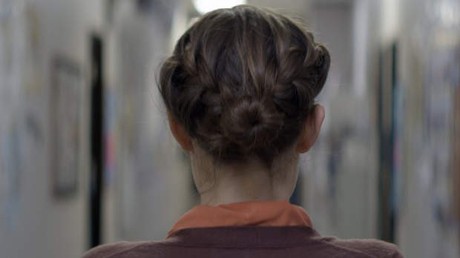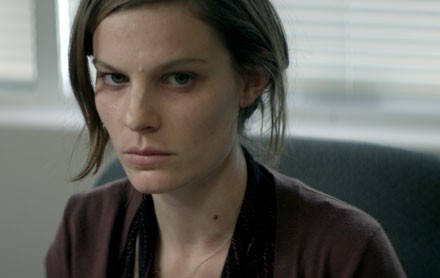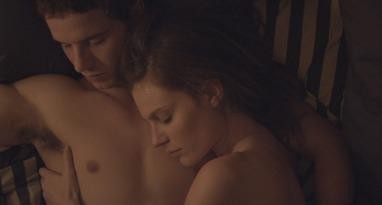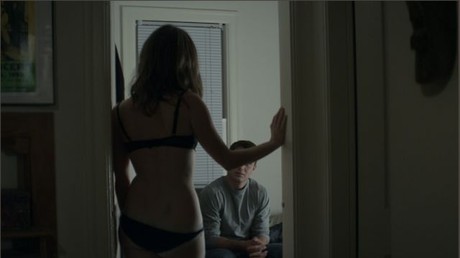Papa Vinyard here, and I got somethin' for ya...

Hannah Fidell is a first-time, Austin-based filmmaker whose first feature film, A TEACHER, premiered at this year's Sundance, and played a bunch of other festivals (including SXSW) before premiering on VOD on August 20th. It is a small, relatively short (clocking in at about 75 minutes) film about a young high school teacher, played by Lindsay Burdge, who is in the midst of an affair with an attractive young student. The pair are seemingly getting away with sneaking off right under the noses of their friends and co-workers, but Burdge's Diana is clearly taking the relationship more seriously than an average fling. The film is low-key and very well acted, and feels natural and human without bearing the cliches of a "mumblecore" production. This is a drama, with believable characters, and the roughness of the aesthetic seems both thoroughly intentional and helpful in establishing the personal nature of the story.
I was able to speak with Ms. Fidell about the movie last week. The interview went as follows:
VINYARD: I just wanted to talk a little bit about A TEACHER, if you don't mind I'll just jump right into the questions.
HANNAH: Yeah, please.
VINYARD: Well, the movie's very character-centric, and it's pretty much- you're in the shoes of this young woman, Diana, who's deeply involved with one of her male students. What specifically inspired you to take on that subject matter?
HANNAH: Well, it's kind of a hybrid of a few things. First is that, because of the budgetary constraints of an indie film, I knew that I wanted to do a single character, kinda "woman on the verge" crisis story. And a lot of my favorite films are…about that, for example THE PIANO TEACHER by Michael Haneke, also OPENING NIGHT, or really any Cassavetes film with Gena Rowlands in it.
VINYARD: Totally.
HANNAH: So those were kinda my inspirations for the film, and a lot of the reason why I chose to do a film about a woman going pretty nuts. (laughs)
VINCENT: You mentioned THE PIANO TEACHER. What about that movie, specifically, influenced your work here?
HANNAH: Well, I had a pretty physical reaction to that film when I first saw it, which I felt was like…um, I felt that it wasn't a passive viewing experience. I felt that my…that I was culpable, in a way, because I was relating to this protagonist, who, in reality, I had nothing in common with, except that we both happen to share the same gender. But that fascinated me, that the director was able to get inside the head of someone who was making horrible decisions, and to me, that was something I wanted to emulate, because I thought it was brilliant, and a fun kind of way to experience a narrative.
VINCENT: It's not easy to get small films like A TEACHER off the ground these days. Could you talk a little bit about how it came together in the development process?
HANNAH: Sure. So it was financed by friends and family, and you're right: if I had taken this through the more traditional route, which I really- I mean this is my first feature film, so, uh, (laughs) I didn't have access to a more traditional route. This is really the only way that I was gonna get a film made, is if I did it myself. But I don't think a film that was- where the total- script is 65 pages…very much atmospheric and not so much necessarily plot-driven, uh, would have gotten financed through a studio or through a major financier system. So, yeah, I think there's freedom in doing it yourself, in the friends and family model, and very helpful, I think, to (laughs) starting a career in making films.

VINCENT: Well, the final film really hinges on the performances, because it's so intimate.
HANNAH: Sure.
VINCENT: How did your relationship with (lead actress) Lindsay Burdge come about?
HANNAH: I met Lindsay when I was working at the front desk at a production company in New York. Lindsay was also working there as a producer, and we became friendly when I made a shorter film with her in it- that she starred in. So I'd already worked with her, and I knew how she worked, I knew the amazing depth she has as an actor, so there was no question that I was going to have her be the teacher when I first got this idea. In fact, she was really involved from the moment that I started writing. She had a lot of influence over her character's background and history.
VINCENT: What was it like directing her on-set? Did you have any rehearsal time, or was it all done during production?
HANNAH: No, we talked a lot about the film, although we didn't have any specific rehearsal time, other than…we would go through the scene right before we were going to shoot, and then have the camera crew come in, see how the scene was going to play out, and (create a) shot list for that. So, in terms of prep, she's a pro, she's naturally very talented, so I feel like I lucked out (laughs) that I didn't have to do as much prep with her as I might've with someone else.
VINCENT: What about (lead actor) Will Brittain? How did he get involved?
HANNAH: He came to an audition I had in Texas, and (pause) he was great, in the audition, and then he came back and auditioned again with Lindsay, just so I could get a read on their chemistry, and it was fantastic. You know, again, another pro, even though he was in college when we shot, and he's young, he was 21 when we made the film. But he really, he was amazing.

VINCENT: How long did you guys shoot for?
HANNAH: We shot for a month.
VINCENT: ok. Well the film has a very low-key look, and it fits, because we're dealing with the lives of some humdrum, average people here. How did you and Andrew Droz Palermo come up with the look of the film?
HANNAH: Well, Andrew and I luckily share very similar aesthetic sensibilities, so I basically…let's see, how did we do this…I gave him a list of films to watch, primarily SILENT LIGHT by Carlos Reygadas, which I think is just one of the most beautifully shot films ever made, and I also gave him a big .zip file that had a ton of still images that I had collected and organized by scene just as references for lighting, or color, or framing. Just something that would evoke a certain feeling for us both, and I think that really helped.
VINCENT: I also love the vibe of the locations, in Austin. Is there any reason you decided to shoot there?
HANNAH: I was living there at the time.
VINCENT: Okay.
HANNAH: Yeah.
VINCENT: Well, now I kinda wanna get into the story. I really love how ambiguous Diana's family life is. You get that scene with her and her brother, and these little tidbits like, you know, her mother's probably sick, but other than that, she's very distant from her family. Why the choice to keep her upbringing and her family at arm's length from the audience like that?
HANNAH: Really that scene was meant to let the audience know that she runs away from her problems. If we had elaborated more about her family life, I think it would have been easy to draw the conclusion that, "Oh she's having this affair because she…you know, because her mom's sick." And…I don't know, I think that's too easy of an answer, so if we could breeze over it and not give all the answers away, I think…it feels more like a real slice of life, instead of a more traditional narrative. Which it isn't.
VINCENT: Right. There's a lot of moments where people almost seem to be kinda figuring out what's going on (between Diane and Eric), and it's about to start that sort of typical narrative that you mentioned. But it never actually happens. Do you think anybody actually realizes that these two are having an affair, and choose not to speak about it? Or do you think no one cares, and it doesn't even occur to them?
HANNAH: I don't think anyone knows that they're having an affair during the movie…during the time period that the movie is supposed to take place in.
VINCENT: It's not made clear- how long have they been having an affair when the movie begins?
HANNAH: It really…it doesn't matter (laughs), because they're still in the affair, which is the important thing.
VINCENT: It does seem like a new thing, it doesn't seem like it's been going on for a very long amount of time.
HANNAH: Umm…maybe, maybe not (we both laugh).

VINCENT: Well, in the second half of the movie, after the relationship's been tested a little bit, Diana starts falling apart pretty severely. Why do you think the relationship starts taking its toll on her, after that amount of time, the way it does?
HANNAH: I think that she develops that kind of tunnel vision that, I don't know if you've ever experienced this, but I know I certainly have, and Lindsay has, and most, at least, women that I know have, where we become so focused on a person that that's really all we can think about, and I think that because so much more is at stake for her- and she's already clearly suffering from various issues which aren't elaborated on the film. But there's already something going on there, so this really puts her over the edge, and…I think it's more about the obsession growing, again because there's so much at stake for her.
VINCENT: Right. And emotionally, there's just as much at stake because you see her (stalking him) on Facebook, and slamming her head (referencing a later scene). It's really taking a physiological impact on her.
HANNAH: Yeah.
VINCENT: And I like that it's not made explicitly clear as to why it goes that far.
HANNAH: Yeah.
VINCENT: These cases come up more and more, in this country, about delusional people who get into self-destructive relationships out of some inexplicable need, and it ends up burying them. We just saw it happen with Anthony Weiner, again, for the second time. Why do you think this is so common in an era where, because of technology, seemingly is more aware of the precedent of this sort of thing, and the context?
HANNAH: I think people are lonely.
VINCENT: Now, more than ever?
HANNAH: Sure. I think so, because even though there's technology that, on the surface level, connects us, the intimacy isn't there, I think less so than there was before. So, yeah, I think it probably comes out of, in the case of Diana- of course I can't speak for the other people who make headlines- it comes out of a place of loneliness.
VINCENT: What else are you working on now?
HANNAH: I am rewriting and about to remake Ida Lupino's THE HITCH-HIKER, which is a film noir from 1953. Actually, it's the first film noir made by a woman, one of the first woman directors ever. It's pretty cool.
VINCENT: Are you making it in the same fashion that you made this one, or are you going the more traditional route in regards to financing.
HANNAH: I'm going a much more traditional route.
VINCENT: Okay. And how far are you along in development?
HANNAH: Doing re-writes, and I'm planning on shooting in the Fall- excuse me, the Winter.
VINCENT: Excellent. Alright, thanks for giving me a little bit of time today, Hannah.
HANNAH: No, thank you.
VINCENT: I really dig the film, and I really wish you all the best.
HANNAH: Thank you so much, I appreciate that.
I really think that the film succeeds both as an intimate character study and a portrayal of how naturally a contextually immoral and illegal relationship like this can occur between normal people. It doesn't have huge action set-pieces or big, swooping dramatic moments, but it is touching, sad, and well-made. I recommend that you catch it in theaters if it's playing near you; if not, you should check to see if your VOD provider is carrying it.
A TEACHER is currently available on VOD and plays selected theaters this Friday (September 6th).
-Vincent Zahedi
”Papa Vinyard”
vincentzahedi@gmail.com
Follow Me On Twitter
